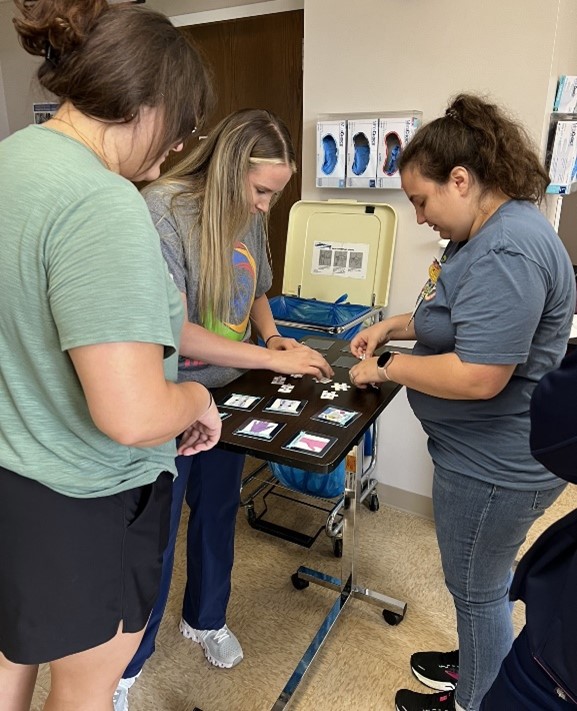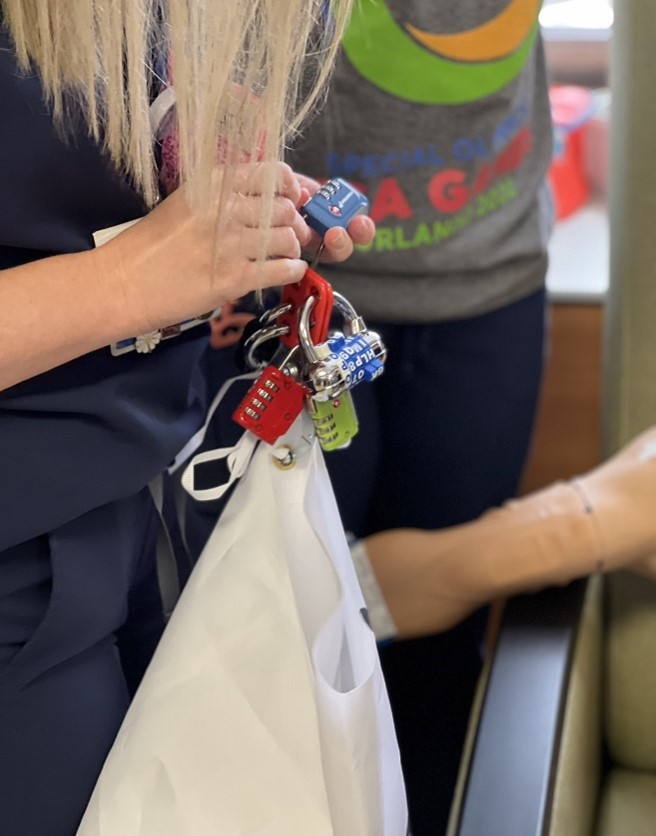Gamification Helps Oncology Nurses Retain Their Cancer Knowledge and Best Practices
Whether it’s through conferences, podcasts, or journals and other articles, an oncology nurse’s quest for continuing their cancer care learning is ever extensive. Innovative educational methods like gamification can keep training fresh and encourage teamwork.
Gamification is the process of adding games or gamelike elements (https://www.merriam-webster.com/dictionary/gamification) to something to encourage participation. It improves nurses’ acquisition of knowledge (https://journals.lww.com/jonajournal/Abstract/2021/02000/Interactive_Learning_for_Nurses_Through.9.aspx) and encourages them to actively participate in learning (https://journals.lww.com/jonajournal/Abstract/2021/02000/Interactive_Learning_for_Nurses_Through.9.aspx) new concepts while reinforcing previous training.
Escape rooms—a popular social activity in today’s society—require participants to complete a series of puzzles or challenges to find a way out of a locked enclosure. ONS members Lauren McGovern, RN, BSN, OCN®, nurse educator at Dana-Farber Cancer Institute (https://www.ons.org/make-a-difference/celebrate/awards/excellence/outstanding-employer) in Boston, MA, and member of the Boston ONS Chapter, and Rae Gardiner, MSN, RN, OCN®, NEA-BC, director of nursing oncology at Lake Charles Memorial Hospital in Lake Charles, LA, and member of the Lake Area ONS Chapter, each created and implemented escape room activities in their staff training and education, an innovative form of gamified nursing education.
Evidence-Based Objectives and Outcomes of an Oncology Nursing Escape Room Gamification
McGovern, who is presenting the outcomes (https://ons.confex.com/ons/2023/meetingapp.cgi/Paper/12671) of her escape room education program at the 48th Annual ONS Congress® (https://www.ons.org/congress/2023) in San Antonio, TX, began her project by conducting a literature review about using gamification methods such as escape rooms during orientation cycles for new oncology nurses.
“I really wanted an interactive way to assess the information our new hires retained during orientation,” McGovern said. “I wanted them to be able to collaborate with one another because collaboration is vital in nursing. And I wanted something that would be memorable.”
McGovern outlined the escape room’s key objectives to measure whether participants learned and retained the cancer care concepts taught during orientation. Using the SMART goals concept (https://www.mindtools.com/a4wo118/smart-goals) (specific, measurable, achievable, relevant, and time-bound), McGovern defined that a successful escape room would enable participants to:
- Recognize a nursing policy and navigate to the intranet policy manual.
- Demonstrate how to program a chemotherapy infusion in the smart infusion pump using the drug library parameters.
- Discover a hazardous spill and dispose of the hazardous materials per institutional policies.
Based on participant survey results, as of January 2023, McGovern reported that out of 52 oncology infusion nurses in seven orientation cycles:
- 94% strongly agreed that topics presented in the escape room are relevant to their role.
- 90% strongly agreed that they are confident they have the basic knowledge to start their clinical orientation in their new department.
- 94% strongly agreed that they are satisfied with their orientation.
McGovern said that because of the positive feedback, she is looking ahead to developing another escape room that promotes interprofessional collaboration with advanced practice providers, clinic assistants, nurses, and even members of pharmacy. Her future escape rooms may also incorporate high-fidelity mannequins and simulation tools.
“As educators and clinical specialists at Dana-Farber, we are working hard to create educational content that is relevant to our practice,” McGovern said. “I base my educational activities on the adult learning theory (https://www.phoenix.edu/blog/adult-learning-theories-principles.html): The content needs to be relevant and timely to what we are doing, so when we learn it, we can put it right into practice. A lot of our staff members are coming with previous experience and knowledge, and being able to acknowledge their experience and create education that builds on that is really important.”

Puzzles and Challenges Foster Teamwork
At Lake Charles Memorial Hospital, Gardiner and her team developed “Mr. G’s Puzzle,” an escape room featuring personal protective equipment (PPE) matching cards, chemotherapy orders and consents, mannequins, an ultraviolet light, and dose calculations that opened several tackle boxes containing institutional and ONS materials as the team made its way to the finish line.
Like McGovern, Gardiner identified measurable objectives before creating the puzzles. She built the escape room’s scenario around experiences that both inpatient and outpatient nurses might experience in their daily practice.
“Small cell lung cancer can be life threatening to some patients, so we used a scenario of a patient getting a treatment plan for small cell lung cancer, because both our inpatient and outpatient nurses might see that,” Gardiner explained. “Once we had Mr. G, we thought about the calculations that were going to be the most challenging for a staff member if they were getting ready to do a dose check and put those into the scenario so that we would be able to guide and test them at the same time.”
Working through the escape room, the nurses demonstrated their clinical competence in calculating doses, checking chemotherapy orders, and safely handling hazardous drugs, including using chemotherapy spill kits and closed-system transfer devices. The nurses unlocked 10–12 tackle boxes, kits, backpacks, and USB drives by completing puzzles and clue cards about information they either already knew or could quickly look up in a policy.
After conducting the escape room training, Gardiner surveyed participants to determine whether it met the learning objectives. One nurse, ONS early career professional member Kristina Spivey, BSN, RN, OCN®, said that it allowed her to engage with her team in a friendly yet competitive way and it was easier for her to retain the topics she learned in the interactive training than in traditional classroom approaches.
“No matter how long you have been a nurse, refresher courses are a necessity to stay on top of best practices and to keep your knowledge current. The escape room was an extremely fun and challenging means of doing so,” Spivey said. “We were asked to calculate chemotherapy dosing based on patient data, the correct order to don and doff PPE when administering chemotherapy, and other topics. Just as mistakes lead to ultimate learning in real life, mistakes during the escape room help you remember topics more so than sitting around a table and reviewing a slideshow.”

Implement Gamification Into Your Practice
McGovern and Gardiner both said that the best way to begin creating an oncology nursing escape room is to determine your measurable educational objectives. It’s a critical first step to help you develop the actual puzzles to use in your room.
“You need to focus on what your objectives are and then form your escape room around your objectives,” McGovern said. Consider using McGovern’s SMART objective approach to build your escape room.
“Ask yourself: ‘What are the most important things within your organization that you’d like your staff to really ingrain?’ Then, implement those within the escape room,” Gardiner added. “We set our own priorities, and we know the educational level of our nurses and where our opportunities are. Looking at that will help you be the most successful.”
Finally, encourage your staff to share feedback on their experience with your escape room. You may find some new ideas to build on your existing puzzles or create new scenarios based on actual clinical challenges they’ve encountered in practice.
Both also urged oncology nurses to connect with others across the nation who are implementing gamification as an educational tool. ONS members can access the ONS Communities (https://communities.ons.org/discussion/oncology-infusion-escape-room) to discuss ideas for oncology nursing escape rooms or other interactive training games.
“I feel like a seed has been planted that will grow into many more hospitals incorporating this sort of interactive learning into their certification processes,” Spivey said. “Nursing is not for the fainthearted, and any chance that we can get to continue to grow in our nursing practice while having fun is something we should all strive for.”
